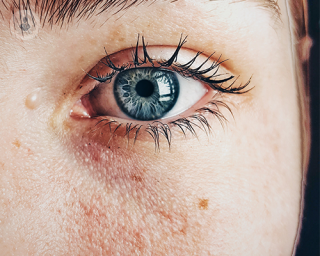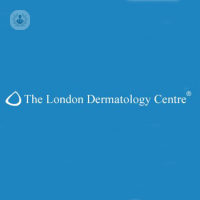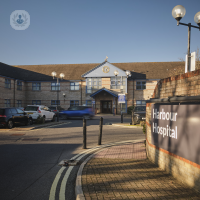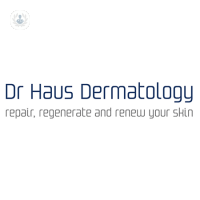What is skin cancer?
Skin cancer is one of the most commonly occuring types of cancer. There are certain types of skin cancer. There are non-melanoma skin cancers which are a group of cancers that are slow-growing and develop on the upper layers of the skin. Basal cell carcinoma (BCC) is the most common type of skin cancer and start in the cells of the lower epidermis. Squamous cell carcinoma (SCC) accounts for around 20% of skin cancers and starts in the upper layers of the epidermis.
Melanoma skin cancer is more serious and can spread to other parts of the body. If you have symtoms of skin cancer you should see a dermatologist.

What are the symptoms of skin cancer?
- smooth and pearly
- may be firm and red
- may sometimes bleed or develop a scab
- never completely heal
- itchy
- tender to the touch
- sometimes bleed
- can have a hard cap
- the skin surrounding the mole is raised
Melanomas will usually start with a change to normal skin or can develop on a mole already present.
You can use the ABCDE mole checklist to help determine if a mole has become a melanoma.
- A – Assymetrical moles
- B – Border of a mole is blurred
- C – Colour of a mole varies
- D – Diameter of the mole is irregular and larger than 7mm
- E – Evolving (melanomas will often change over time)
What causes skin cancer?
Non-melanoma skin cancers are caused by too much exposure to ultraviolet (UV) light, which comes from the sun, as well as tanning beds.
There are also a number of risk factors that can increase the chances of non-melanoma developing:
- family history of skin cancer
- pale skin that burns easily
- people with lots of moles and freckles
- medication of a medical condition that suppresses the immune system
- previous non-melanoma skin cancer
Melanoma is caused by exposure to UV light from the sun or tanning beds. Melanomas are caused by very intense exposure to UV light, such as bad sunburn on holiday.
The following risk factors increase your chances of developing melanoma:
- pale skin
- blonde or red hair
- family history of melanoma
- people with lots of moles and freckles
How can skin cancer be prevented?
It is possible to reduce your chances of developing skin cancer by reducing exposure to sunlight and avoiding sunburn. You can do this by avoiding tanning beds, covering up outdoors and wearing high SPF sunscreen. You can also avoid the sun during the hottest part of the day. It is also important to check your skin regularly and notice any changes as early diagnosis increased the chances of treatment.
What is the treatment for skin cancer?
Non-melanoma skin cancer can be treated firstly by surgically removing the cancerous tumour and surrounding skin. Non-melanoma skin cancer can also be removed to using cryotherapy (freezing). They can also be treated with radiotherapy and photodynamic therapy (PDT). Treatment option depends on the size of the skin cancer, the type and the location. Non-melanoma skin cancers are often treated successfully as the risk of the cancer spreading to other parts of the body is much lower than with melanomas.
Melanoma skin cancer is treated surgically most of the time, however, treatment depends on the circumstances of your diagnosis. Early detection and treatment can successfully treat melanoma. Advanced melanoma treatment aims to slow down the spread of the cancer and improve the symptoms. Melanoma can return once treated, so regular check-ups are essential.
10-23-2015 08-03-2023Skin cancer
Miss Katherine George - Oral & maxillofacial surgery
Created on: 10-23-2015
Updated on: 08-03-2023
Edited by: Kate Forristal
What is skin cancer?
Skin cancer is one of the most commonly occuring types of cancer. There are certain types of skin cancer. There are non-melanoma skin cancers which are a group of cancers that are slow-growing and develop on the upper layers of the skin. Basal cell carcinoma (BCC) is the most common type of skin cancer and start in the cells of the lower epidermis. Squamous cell carcinoma (SCC) accounts for around 20% of skin cancers and starts in the upper layers of the epidermis.
Melanoma skin cancer is more serious and can spread to other parts of the body. If you have symtoms of skin cancer you should see a dermatologist.

What are the symptoms of skin cancer?
- smooth and pearly
- may be firm and red
- may sometimes bleed or develop a scab
- never completely heal
- itchy
- tender to the touch
- sometimes bleed
- can have a hard cap
- the skin surrounding the mole is raised
Melanomas will usually start with a change to normal skin or can develop on a mole already present.
You can use the ABCDE mole checklist to help determine if a mole has become a melanoma.
- A – Assymetrical moles
- B – Border of a mole is blurred
- C – Colour of a mole varies
- D – Diameter of the mole is irregular and larger than 7mm
- E – Evolving (melanomas will often change over time)
What causes skin cancer?
Non-melanoma skin cancers are caused by too much exposure to ultraviolet (UV) light, which comes from the sun, as well as tanning beds.
There are also a number of risk factors that can increase the chances of non-melanoma developing:
- family history of skin cancer
- pale skin that burns easily
- people with lots of moles and freckles
- medication of a medical condition that suppresses the immune system
- previous non-melanoma skin cancer
Melanoma is caused by exposure to UV light from the sun or tanning beds. Melanomas are caused by very intense exposure to UV light, such as bad sunburn on holiday.
The following risk factors increase your chances of developing melanoma:
- pale skin
- blonde or red hair
- family history of melanoma
- people with lots of moles and freckles
How can skin cancer be prevented?
It is possible to reduce your chances of developing skin cancer by reducing exposure to sunlight and avoiding sunburn. You can do this by avoiding tanning beds, covering up outdoors and wearing high SPF sunscreen. You can also avoid the sun during the hottest part of the day. It is also important to check your skin regularly and notice any changes as early diagnosis increased the chances of treatment.
What is the treatment for skin cancer?
Non-melanoma skin cancer can be treated firstly by surgically removing the cancerous tumour and surrounding skin. Non-melanoma skin cancer can also be removed to using cryotherapy (freezing). They can also be treated with radiotherapy and photodynamic therapy (PDT). Treatment option depends on the size of the skin cancer, the type and the location. Non-melanoma skin cancers are often treated successfully as the risk of the cancer spreading to other parts of the body is much lower than with melanomas.
Melanoma skin cancer is treated surgically most of the time, however, treatment depends on the circumstances of your diagnosis. Early detection and treatment can successfully treat melanoma. Advanced melanoma treatment aims to slow down the spread of the cancer and improve the symptoms. Melanoma can return once treated, so regular check-ups are essential.


Lumps, bumps and growths: What to expect from skin lesion removal
By Mr Philip Ridings
2025-01-11
Removing moles, growths and other lumps and bumps is a relatively fast and painless procedure. In this article, highly esteemed general surgeon Mr Philip Ridings outlines the most common types of skin lesions and when it is necessary to remove them. He also offers reassurance about what patients can expect from the removal procedure. See more


Basal cell carcinoma: the most common skin cancer
By Dr Raj Mallipeddi
2025-01-11
Of all the types of skin cancer, basal cell carcinoma (BCC) is the most common. Learn how basal cell carcinoma manifests, what causes it and how it’s treated from Dr Raj Mallipeddi, a consultant dermatologist and specialist in skin cancer. See more


Expert insight: Recognising skin cancer
By Dr Zeeshaan-Ul Hasan
2025-01-11
Leading consultant dermatologist Dr Zeeshaan-Ul Hasan offers an informative guide to the signs of skin cancer in this detailed article. See more


Mole removal surgery for skin cancer prevention: Why early detection is key
By Dr Jonathan Slater
2025-01-11
Mole removal surgery is a crucial preventive measure in reducing the risk of skin cancer. Skin cancer, particularly malignant melanoma, can develop from abnormal changes in moles. Early detection and removal of suspicious moles provide the best chance for preventing the spread of skin cancer, improving long-term outcomes for patients. See more
Experts in Skin cancer
-
Dr Raj Mallipeddi
DermatologyExpert in:
- Cosmetic dermatology
- Surgical dermatology
- Skin cancer
- Mohs surgery
- Laser
- Photodynamic therapy
-
Dr Saqib Jawaid Bashir
DermatologyExpert in:
- Mohs surgery
- Cosmetic dermatology
- Laser
- Skin cancer
- Scars
- Acne
-
Mr Alastair MacKenzie Ross
Plastic surgeryExpert in:
- Melanoma
- Electrochemotherapy
- Keloid scars
- Scars
- Surgical oncology
- Skin cancer
-
Dr Gayathri Perera
DermatologyExpert in:
- Skin cancer
- Acne
- Rosacea
- Paediatric dermatology
- Psoriasis
- Autoimmune diseases
-
Dr Kapil Bhargava
DermatologyExpert in:
- Skin cancer
- Alopecia
- Moles
- Dermoscopy
- Mohs surgery
- Cosmetic dermatology
- See all

The London Dermatology Centre
The London Dermatology Centre
69 Wimpole Street, London, W1G 8AS
No existe teléfono en el centro.
By using the telephone number provided by TOP DOCTORS, you automatically agree to let us use your phone number for statistical and commercial purposes. For further information, read our Privacy Policy
Top Doctors

The Harbour Hospital - part of Circle Health Group
The Harbour Hospital - part of Circle Health Group
St Mary's Rd, Poole BH15 2BH
No existe teléfono en el centro.
By using the telephone number provided by TOP DOCTORS, you automatically agree to let us use your phone number for statistical and commercial purposes. For further information, read our Privacy Policy
Top Doctors

Dr Haus Dermatology
Dr Haus Dermatology
75 Harley Street, Marylebone
No existe teléfono en el centro.
By using the telephone number provided by TOP DOCTORS, you automatically agree to let us use your phone number for statistical and commercial purposes. For further information, read our Privacy Policy
Top Doctors
-
The London Dermatology Centre
69 Wimpole Street, London, W1G 8AS, W1G Marylebone LondonExpert in:
- Skin Cancer
- Dermatology
- Clinical Dermatology
- Cosmetic Dermatology
- Surgical Dermatology
-
The Harbour Hospital - part of Circle Health Group
St Mary's Rd, Poole BH15 2BH, PooleExpert in:
- Hip
- Cancer
- General Surgery
- Oral surgery
- Orthopaedic surgery
- Diagnosis of Cancer
-
Dr Haus Dermatology
75 Harley Street, Marylebone, W1G Marylebone LondonExpert in:
- Acne
- Dermatitis
- Nail infections
- Skin lesions
- Moles
- Rosacea
- Most viewed diseases, medical tests, and treatments
- HHT (Hereditary Haemorrhagic Telangiectasia)
- Snoring
- Polysomnography (sleep study)
- Immunotherapy
- Chronic headache
- Nystagmus
- Facial feminisation surgery
- CAR-T cells
- Hormone therapy
- Migraine







